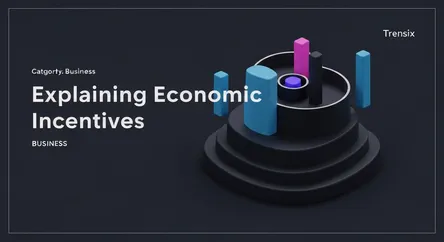Business
Explaining Economic Incentives

Discover what incentives are and how they are used by governments and businesses to influence the economic decisions we make every day.
What is it?
An incentive is anything that motivates or encourages an individual to perform an action. In economics, it's a fundamental concept that explains how people make decisions. Incentives can be positive (rewards) or negative (punishments). Positive incentives, like a bonus at work or a store discount, offer a reward for a certain behavior. Negative incentives, often called disincentives, such as a fine for speeding or a tax on cigarettes, introduce a cost to discourage an action. They come in various forms, including financial (money), moral (doing the right thing), and social (peer recognition).
Why is it trending?
Incentives are a constant topic in economic and policy discussions, especially as governments and companies navigate complex challenges. We see them in climate change policies through tax credits for electric vehicles, in public health with rewards for vaccinations, and in corporate strategies to attract and retain talent with competitive bonuses and benefits. The rise of behavioral economics has also highlighted how carefully designed 'nudges' and incentives can guide people toward better choices without restricting their freedom, making it a powerful tool for policymakers.
How does it affect people?
Incentives shape our daily lives profoundly, influencing our choices as consumers, employees, and citizens. A "buy one, get one free" offer might persuade you to purchase a product you hadn't planned on buying. The prospect of a promotion can motivate you to work harder. On a larger scale, government subsidies can make housing or education more affordable, while taxes can alter consumption patterns for goods like sugar or fuel. Understanding the incentives at play helps explain why people and economies behave the way they do, though sometimes they can lead to unintended consequences if not designed carefully.